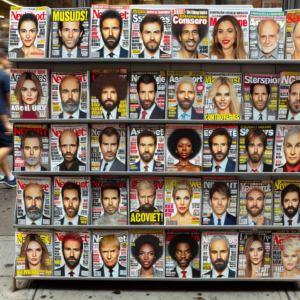Unmasking the Chaos: The Dark Side of Social Media Feuds Revealed
[caption id="attachment_33834" align="alignnone" width="614"] Celebrity News - Social Media[/caption]
In an era where social media platforms serve as primary communication channels, the phenomenon of online feuds has become increasingly prevalent. These conflicts, often fueled by misunderstandings, differing opinions, or personal grievances, can escalate rapidly, leading to significant consequences for individuals and communities alike. This article aims to explore the multifaceted nature of social media feuds, their psychological impact, the role of algorithms in exacerbating conflicts, notable case studies, and strategies to mitigate their negative effects.
Understanding the Nature of Social Media Feuds: A Comprehensive Overview
Social media feuds can be defined as public disputes that occur on digital platforms, often characterized by hostile exchanges, name-calling, and the sharing of derogatory content. These conflicts can arise from various sources, including political disagreements, celebrity controversies, or personal disputes between users. The anonymity and distance provided by online interactions often embolden individuals to express their opinions more aggressively than they might in face-to-face encounters. As a result, social media feuds can escalate quickly, drawing in bystanders and creating a cycle of retaliation that can be difficult to contain. Understanding the dynamics of these feuds is essential for recognizing their potential impact on both individual participants and broader communities.
The Psychological Impact of Online Conflicts on Individuals and Communities
The psychological ramifications of social media feuds are profound and far-reaching. For individuals involved in these conflicts, the experience can lead to heightened stress, anxiety, and feelings of isolation. Victims of online harassment may suffer from depression and a diminished sense of self-worth, while aggressors may experience guilt or shame after engaging in hostile behavior. Communities, too, can feel the effects, as feuds often create divisions and foster an environment of hostility. The polarization of opinions can lead to a breakdown in communication, making it increasingly difficult for individuals to engage in constructive dialogue. As a result, the mental health of both individuals and communities can be significantly compromised by the toxic nature of online conflicts.
Analyzing the Role of Algorithms in Amplifying Social Media Disputes
Algorithms play a crucial role in shaping the content that users encounter on social media platforms. Designed to maximize engagement, these algorithms often prioritize sensational or controversial content, which can inadvertently amplify social media feuds. When users engage with inflammatory posts, algorithms are more likely to promote similar content, creating a feedback loop that escalates conflicts. This amplification can lead to an environment where extreme viewpoints dominate discussions, drowning out more moderate perspectives. Furthermore, the viral nature of social media means that feuds can quickly gain traction, reaching audiences far beyond the original participants. Understanding the mechanics of these algorithms is essential for recognizing how they contribute to the proliferation of online conflicts.
Case Studies: Notable Social Media Feuds and Their Consequences
Several high-profile social media feuds have highlighted the destructive potential of online conflicts. One notable example is the feud between celebrities Taylor Swift and Kanye West, which began in 2009 and has continued to resurface over the years. This ongoing conflict has not only affected the personal lives of those involved but has also sparked widespread public discourse about issues such as misogyny and celebrity culture. Another significant case is the online dispute between various political figures during election cycles, which often leads to the spread of misinformation and increased polarization among the electorate. These case studies illustrate how social media feuds can have lasting consequences, influencing public opinion and shaping societal narratives.
The Ripple Effect: How Feuds Influence Public Perception and Behavior
Social media feuds can create a ripple effect that extends far beyond the original conflict. As these disputes unfold, they often attract media attention, further amplifying the messages and emotions involved. This heightened visibility can shape public perception, influencing how individuals view the parties involved and the issues at stake. For instance, a feud between two public figures can lead to increased scrutiny of their actions and statements, potentially affecting their careers and public image. Additionally, the emotional intensity of these conflicts can inspire followers to take sides, leading to real-world consequences such as protests, boycotts, or even violence. The ability of social media feuds to shape public behavior underscores the importance of understanding their broader implications.
Strategies for Mitigating the Negative Effects of Social Media Conflicts
To address the negative effects of social media feuds, several strategies can be employed by individuals, communities, and platform developers. First, fostering digital literacy is essential; users should be educated about the nature of online interactions and the potential consequences of their actions. Encouraging empathy and respectful dialogue can help mitigate conflicts before they escalate. Additionally, social media platforms can take a proactive approach by refining their algorithms to prioritize constructive content and reduce the visibility of inflammatory posts. Implementing stronger moderation policies can also help create a safer online environment. Finally, promoting mental health resources for individuals affected by online conflicts can provide much-needed support and guidance. By adopting these strategies, it is possible to reduce the prevalence and impact of social media feuds.
In conclusion, social media feuds represent a complex and multifaceted issue that affects individuals and communities on various levels. Understanding the nature of these conflicts, their psychological impact, and the role of algorithms is crucial for navigating the digital landscape. By examining notable case studies and recognizing the ripple effects of online disputes, we can better appreciate the importance of fostering a more respectful and constructive online environment. Through targeted strategies and a commitment to empathy, it is possible to mitigate the negative consequences of social media feuds and promote healthier interactions in the digital age.
